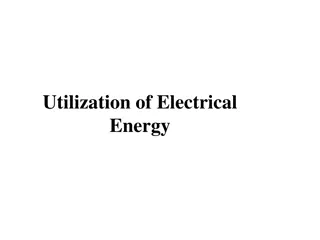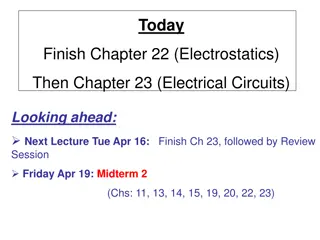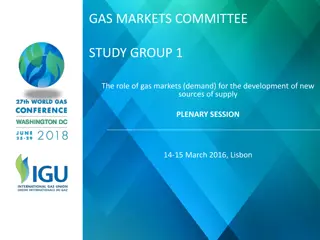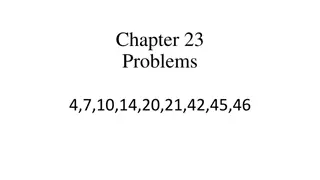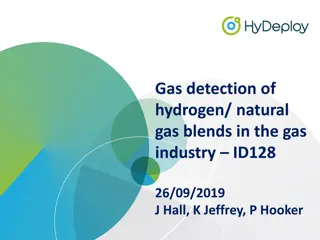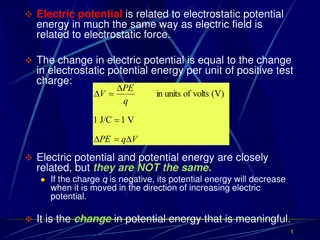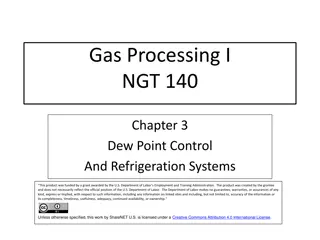Gas-Electric Working Group Meeting Highlights - July 15, 2022
Gas-Electric Working Group meeting on July 15, 2022, discussed topics including Antitrust Admonition, Gas Industry Changes under new Texas RRC Regulations, Critical Designation of Natural Gas Infrastructure, Supply Chain Mapping, Gas-Electric Load Coordination Process, and introduction of James Stevens as the new ERCOT Gas Coordination Lead.
Download Presentation

Please find below an Image/Link to download the presentation.
The content on the website is provided AS IS for your information and personal use only. It may not be sold, licensed, or shared on other websites without obtaining consent from the author.If you encounter any issues during the download, it is possible that the publisher has removed the file from their server.
You are allowed to download the files provided on this website for personal or commercial use, subject to the condition that they are used lawfully. All files are the property of their respective owners.
The content on the website is provided AS IS for your information and personal use only. It may not be sold, licensed, or shared on other websites without obtaining consent from the author.
E N D
Presentation Transcript
Gas Electric Working Group Meeting July 15, 2022
Agenda Antitrust Admonition Gas Industry Changes (Texas Railroad Commission Regulations) o Rule 3.65 Critical Designation of Natural Gas Infrastructure o Supply Chain Mapping Natural gas infrastructure supporting electric generation shared with Texas RRC for contributions to Supply Chain Map o Natural Gas Curtailment (adopted Rule 7.455 on April 12, 2022) o Natural Gas Weatherization Rule (published in Texas Register today targeted to be effective September 1, 2022) Gas-Electric Load Coordination Process o Importance of Communication (between Resources and Fuel Suppliers) Leveraging Maintenance Outage Information GEWG Scope / Black Start Gas Coordination Group (BSGCG) o Proposal to extend membership to certain natural gas trade groups GEWG Leadership Introduction of James Stevens, new ERCOT Gas Coordination Lead Adjourn 2
Gas Industry Changes - New Texas RRC Regulations Rule 3.65 Critical Designation of Natural Gas Infrastructure Critical Designation Criteria Established Critical Gas Supplier Gas wells producing in excess of 15 Mcf/day; Oil lease producing casinghead gas in excess of 50 Mcf/day; Gas Processing Plants; Natural Gas Pipelines, and pipeline facilities including associated compressor stations and control centers; Local gas distribution company pipelines and pipeline facilities including associated compressor stations and control centers; Underground natural gas storage facilities; Natural gas liquids transportation and storage facilities; and Saltwater disposal facilities including saltwater disposal pipelines. Critical Customer a critical gas supplier for whom the delivery of electricity from an electric entity is essential to the ability of such gas supplier to operate. Requires critical customer to file customer information to the applicable electric entities. 4
Gas Industry Changes - New Texas RRC Regulations Rule 3.65 Critical Designation of Natural Gas Infrastructure Facilities not meeting these criteria may apply to the RRC for critical designation. Operators required to acknowledge critical status by filing Form CI-D biannually (March 1 and September 1). Exception provision available but facilities ineligible for exception includes Facilities included Supply Chain Security Map; Gas well or oil leases producing gas in excess of 250 Mcf/day; Gas processing plants; Natural gas pipelines that directly serve local gas distribution companies or electric generation; Local gas distribution company pipelines and pipeline facilities; Underground natural gas storage facilities; Saltwater disposal facilities including saltwater disposal pipelines that support the foregoing. Provides for administration of financial penalties for violations of Rule 3.65. 5
Gas Industry Changes - New Texas RRC Regulations Supply Chain Mapping Natural gas infrastructure supporting electric generation shared with Texas RRC for contributions to the Texas Electricity and Supply Chain Security Mapping Committee. Gas operators serving electric generation facilities provided extensive information to the Committee including, but not limited to; Generation Facility Owner/Operator; 1-year of historical volumes (July 2020 through June 2021); Type of service provided; Associated upstream and downstream pipeline providers; Contracted service obligation(s); Location of receipt points; and Flow path from those receipts to the generation facility. 6
Gas Industry Changes - New Texas RRC Regulations Rule 7.455 Curtailment Standards Approved on April 12, 2022 to be effective September 1, 2022. The Texas RRC also made modifications to the Curtailment Standards, more specifically establishing; Definitions Applicability and Priorities elevating electric generation in the overall prioritization Gas utility shall apply the following priorities in descending order during a curtailment event: (A) firm deliveries to human needs customers and firm deliveries of natural gas to local distribution systems which serve human needs customers; (B) firm deliveries to electric generation facilities;. 7
Gas Industry Changes - New Texas RRC Regulations Rule 3.66 Weather Emergency Preparedness Standards Scheduled for publication in the Texas Register today (July 15, 2022) Applicability Under Texas Natural Resources Code 86.044, applies to a gas supply chain facility that is Included in the electricity supply chain map under Texas Utilities Code 38.203 and Designated as critical under Rule 3.65 Critical Designation of Natural Gas Infrastructure, Under Texas Utilities Code 2121.2015, applies to a gas pipeline facility that Directly serves a natural gas electric generation facility operating to provide power to ERCOT or for the ERCOT power region and an adjacent power region; and Is included in the electricity supply chain map under Texas Utilities Code 38.203. 8
Gas Industry Changes - New Texas RRC Regulations Rule 3.66 Weather Emergency Preparedness Standards Definitions Includes critical components, gas pipeline facilities, supply chain facilities (producing treating, processing, pressurizing, storing, or transporting natural gas, as well as handling waste produced), major and repeated weather-related forced stoppages, weather emergency, and weatherization. Weather Preparedness Standards Must be implemented by December 1 of each year with intended to: Ensure the sustained operation of a gas supply chain facility or a gas pipeline facility; and Correct known weather-related forced stoppages that prevented sustained operation because of previous cold weather. 9
Gas Industry Changes - New Texas RRC Regulations Rule 3.66 Weather Emergency Preparedness Standards These weather emergency preparation measures shall include: self-assessment, inspections and tests critical components and other equipment; providing training on weather emergency preparations and operations to relevant operating personnel; emergency operations planning using a risk-based approach to identify, test and protect critical facility components ; and weatherization methods applicable to the facility based on its type, critical components, location and weather data for the facilities county or counties. Such methods may include, but not be limited to; onsite fuel, spare parts, chemicals and other materials; securing operating personnel and contractors; installing adequate wind breaks or temporary enclosures, thermal insulation and/or heat tracing for equipment, facilities, sensors, and instrumentation; 10
Gas Industry Changes - New Texas RRC Regulations Rule 3.66 Weather Emergency Preparedness Standards (continued) establishing a schedule of testing for such freeze protection components prior to December and through March of each year; creating accessible operating procedures to be taken during extreme weather conditions; coordinating with local authorities for allowing ingress and egress to critical facilities during weather emergencies. 11
Gas Industry Changes - New Texas RRC Regulations Rule 3.66 Weather Emergency Preparedness Standards Submittal or a Weather Emergency Readiness Attestation. Sworn to by an authorized officer of the operator entity, that: The operator has implemented the required weather preparation measures; The information and statements made in the attestation are true, correct and complete; The authorized officer is responsible for regulatory compliance; The officer is authorized to sign the attestation on behalf of the operator entity; and The Weather Emergency Readiness Attestation was prepared by the authorized officer or under the authorized officer s supervision and direction; and 12
Gas Industry Changes - New Texas RRC Regulations Rule 3.66 Weather Emergency Preparedness Standards Submittal or a Weather Emergency Readiness Attestation (continued) Includes an attachment describing all activities engaged in by the operator to implement the requirements for the following categories applicable to the facility, including process piping and vessels; process fluids; fuel gas systems; tankage, terminals and distribution; instrument air, electrical and water management systems; utility connections; pumps, compressors and turbines; air intake systems; chemical tanks and porta feeds; flare systems, safety systems ; maintenance preparation and readiness, closed loop glycol heater and tracing systems; and additional critical components not listed. And for the December 1, 2022 filing, also describes the corrective actions taken to mitigate known weather-related forced stoppages that prevented the sustained operations of a facility because of previous cold weather conditions. 13
Gas Industry Changes - New Texas RRC Regulations Rule 3.66 Weather Emergency Preparedness Standards Inspection of gas supply chain facilities and gas pipeline facilities are subject to RRC inspections to ensure compliance. Weather-related forced stoppages by a gas pipeline facility or gas supply chain facility requires notice to the RRC. Operators of a gas supply chain facility or a gas pipeline facility that experiences a weather-related forced stoppage in sustained operations shall notify the RRC if not resolved within 24 hours of discovery. And if such weather-related forced stoppage results in a loss of production exceeding 5,000 Mcf of natural gas per day, or a stoppage of gas processing, storage withdrawal, or transportation of 200 MMcf per day, the operator shall immediately contact the RRC s Critical Infrastructure Division. 14
Gas Industry Changes - New Texas RRC Regulations Rule 3.66 Weather Emergency Preparedness Standards Weather-related forced stoppages (continued) Operators of a gas supply chain facility or a gas pipeline facility that experiences repeated weather-related forced stoppages in sustained operation shall, upon notice from the RRC, contract with a qualified engineer (not an employee of the facility or its affiliate) to assess its weather emergency preparation measures, plans procedures and operations, submitting such response to the RRC along with a corrective action plan. Enforcement mechanisms for violations of a gas supply chain facility operator or gas pipeline operator may trigger substantive penalties up to $1,000,000. 15
Gas Industry Changes Texas RRC Establishes Critical Infrastructure Division (CID) The CID will strictly enforce and manage adherence to weatherization rules, adopted by the RRC, including ensuring companies within the natural gas supply chain register their assets as critical infrastructure. Inspectors and staff will manage the CID process as well as perform field inspections of natural gas producing, treating, pipeline and underground storage locations throughout the State. CID has recently issued formal requests for emergency operating plans to gas supply chain and gas pipeline operators in anticipation of rulemaking. 16
Gas-Electric Coordination Process Importance of Communication GEWG encourages two-way communication between Resources and Fuel Suppliers Leveraging maintenance outage information, Coordinating outages where possible, Leveraging opportunities to work together for the benefit of all Texans. 17
GEWG Scope and Black Start Gas Coordination Group (BSGCG) o Proposal to extend membership to certain natural gas trade groups. 18
Black Start Gas Coordination Group (BSGCG) BSGCG The Black Start Gas Coordination Group is comprised of ERCOT Transmission Service Providers, QSE & RE s representing Black Start Resources, Gas Transmission Operators, Gas Suppliers and ERCOT Signed Memorandum of Understanding(MOU) and Non-Disclosure Agreement required to attend meetings Encourage coordination and communication between Transmission Service Providers and Gas Pipeline Operators and Gas Suppliers. Transmission Operators incorporate Black Start gas critical loads into their Black Start Plans as priority loads. BSGCG reviews the list of priority loads that would need off-site power during a black start event to maintain gas flows to Black Start and next start Resources.
GEWG Leadership Welcome James Stevens, new ERCOT Gas Coordination Lead Next GEWG Meeting Fall 2022 20
Adjourn Gas Electric Working Group Meeting July 15, 2022









